2004 United States presidential election
| |||||||||||||||||||||||||||||
All 538 electoral votes of the Electoral College 270 electoral votes needed to win | |||||||||||||||||||||||||||||
|---|---|---|---|---|---|---|---|---|---|---|---|---|---|---|---|---|---|---|---|---|---|---|---|---|---|---|---|---|---|
| Turnout | 56.7%[1] | ||||||||||||||||||||||||||||
| |||||||||||||||||||||||||||||
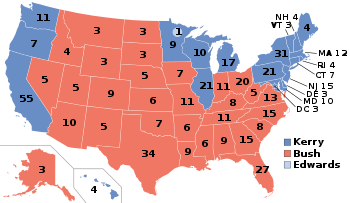 Presidential election results map. Red denotes states won by Bush/Cheney (31), Blue denotes those won by Kerry/Edwards (19+DC). The split vote in Minnesota denotes a faithless elector's vote counted for John Edwards. Each number represents the electoral votes a state gave to one candidate. | |||||||||||||||||||||||||||||
| |||||||||||||||||||||||||||||
The 2004 United States presidential election happened on November 2, 2004. George W. Bush, the incumbent president and Republican candidate, won reelection. He defeated John Kerry, the Democratic candidate, who was the junior U.S. Senator from Massachusetts. Foreign policy was the biggest issue during the election mainly because of the War on Terrorism and the 2003 Invasion of Iraq.
Since the last presidential election, there were concerns about voting. The winner was not determined until the following day when Kerry decided not to dispute Bush's win in the state of Ohio. The state held enough electoral votes to determine the winner of the presidency. Both Kerry and Democratic National Committee Chairman Howard Dean have stated their opinion that voting in Ohio did not proceed fairly and that, had it done so, the Democratic ticket might have won that state and therefore the election.[2]
Only three states changed which party to vote for. New Mexico and Iowa voted Democratic in 2000, but those states voted Republican in 2004. New Hampshire voted Republican in 2000 but the state voted Democratic in 2004. In the Electoral College, Bush received 286 electoral votes, and Kerry received 251 electoral votes. Kerry was supposed to have 252, but one electoral vote that was supposed to go for Kerry went for his running mate, John Edwards.
Candidates[change | change source]
Republican[change | change source]
Nominees[change | change source]
 | |||||||||||||||||||||||||||||
| George W. Bush | Dick Cheney | ||||||||||||||||||||||||||||
|---|---|---|---|---|---|---|---|---|---|---|---|---|---|---|---|---|---|---|---|---|---|---|---|---|---|---|---|---|---|
| for President | for Vice President | ||||||||||||||||||||||||||||
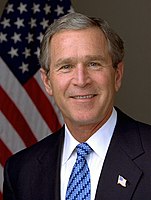 |
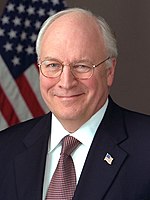 | ||||||||||||||||||||||||||||
| 43rd President of the United States (2001–2009) |
46th Vice President of the United States (2001–2009) | ||||||||||||||||||||||||||||
| Campaign | |||||||||||||||||||||||||||||
 | |||||||||||||||||||||||||||||
Democrats[change | change source]
Nominees[change | change source]
 | |||||||||||||||||||||||||||||
| John Kerry | John Edwards | ||||||||||||||||||||||||||||
|---|---|---|---|---|---|---|---|---|---|---|---|---|---|---|---|---|---|---|---|---|---|---|---|---|---|---|---|---|---|
| for President | for Vice President | ||||||||||||||||||||||||||||
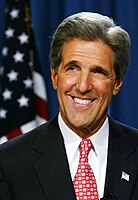 |
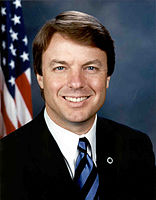 | ||||||||||||||||||||||||||||
| U.S. Senator from Massachusetts (1985–2013) |
U.S. Senator from North Carolina (1999–2005) | ||||||||||||||||||||||||||||
| Campaign | |||||||||||||||||||||||||||||
Withdraw candidates[change | change source]
- John Edwards, U.S. Senator from North Carolina (withdrew on March 2, 2004, and endorsed John Kerry)
- Howard Dean, former Governor of Vermont (withdrew on February 18, 2004, and endorsed John Kerry)
- Wesley Clark, retired U.S. General from Arkansas (withdrew on February 11, 2004, and endorsed John Kerry)
- Dennis Kucinich, U.S. Representative from Ohio (withdrew on July 22, 2004, and endorsed John Kerry)
- Al Sharpton, Reverend and civil rights activist from New York (withdrew on March 15, 2004, and endorsed John Kerry)
- Joe Lieberman, U.S. Senator from Connecticut, 2000 US Election Democratic vice-presidential nominee (withdrew on February 3, 2004, and endorsed John Kerry)
- Dick Gephardt, U.S. Representative from Missouri (withdrew on January 20, 2004, and endorsed John Kerry)
- Carol Moseley Braun, former U.S. Senator from Illinois (withdrew on January 15, 2004, and endorsed Howard Dean. She then endorsed John Kerry)
- Bob Graham, U.S. Senator from Florida (withdrew on October 6, 2003, and endorsed John Kerry)
-
-
-
-
-
-
-
-
-
-
Political Activist
Lyndon LaRouche
of Virginia
References[change | change source]
- ↑ "Voter Turnout in Presidential Elections". Presidency.ucsb.edu. Retrieved 2016-08-18.
- ↑ ROBERT F. KENNEDY JR (June 1, 2006). "Was the 2004 Election Stolen? : Rolling Stone". Rollingstone.com. Archived from the original on 2008-10-22. Retrieved 2008-11-03.










